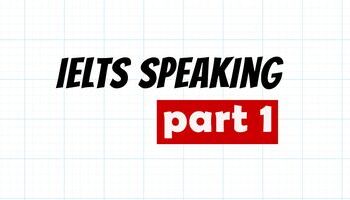Ở bài học IELTS Speaking online trước, cô đã giới thiệu đến các em Tổng quan về phần thi này. Hôm nay, chúng ta sẽ tiếp tục với bài học về phần đầu tiên trong tổng thể bài thi này.
Đó chính là Unit 2: IELTS Speaking Part 1 - Phỏng vấn ngắn. Cô sẽ cung cấp cho các em những thông tin tổng quan về Part 1, các dạng câu hỏi và câu trả lời thường gặp cũng như một số tip giúp nâng cao điểm Nói lên nhé.
1. Tổng quan về Speaking Part 1
Trong Part 1, giám khảo sẽ hỏi những câu hỏi liên quan đến những chủ đề quen thuộc như nhà, gia đình, công việc, học tập hay sở thích của bạn. Thời gian dành cho Part 1 là 4-5 phút, tương đương với 10-11 câu hỏi thuộc 2-3 chủ đề.
Thường các câu hỏi trong Part 1 tương đối đơn giản, và giám khảo được yêu cầu phải đi hết các câu hỏi trong vòng 5 phút, vì vậy bạn chỉ có 30 giây để trả lời mỗi câu hỏi. Nếu như đưa ra câu trả lời dài hơn giám khảo sẽ dừng bạn.
Dưới đây là một ví dụ một câu trả lời đơn giản và hiệu quả:
- Do you prefer home-cooked food or food from restaurants?
- I prefer home-cooked food because I think it's healthier and you know exactly what you're eating. I also enjoy cooking for family and friends.
(Nguồn: ielts-simon.com)
Lưu ý:
- Trong phần Part 1 của đề thi IELTS Speaking, chúng ta cần chú ý trọng tâm vào tiêu chí FLUENCY
- Speaking Part 1 là cơ hội để các bạn có thể gây ấn tượng với giám khảo
- Các câu hỏi đều tương đối cá nhân, có liên quan trực tiếp đến bản thân bạn nên việc trả lời những câu hỏi này cũng khá dễ dàng
- Không giống như khi các bạn phải suy nghĩ nhiều để trả lời Part 2, Part 3, các bạn có thể thể hiện được “FLUENCY” trong part 1.
2. Chiến lược trả lời Speaking Part 1
- Câu trả lời không được quá ngắn hoặc quá dài.
- Đưa câu trả lời ở dạng đầy đủ (full sentence)
- Dùng từ đã xuất hiện trong câu hỏi để đưa câu trả lời
- Đưa ra thông tin thêm vào để kéo dài câu trả lời trong vòng 15-20s, khoảng 3 câu trả lời.
- Đừng quên nói “yes” hoặc “no” khi cần thiết
Example:
- Do you like parks?
- Yes, I like parks because they are great places to relax. If you live in a city, a park is often the only place where you can escape from the noise and the traffic.
3. Cách kéo dài câu trả lời
Trong Part 1, nếu câu trả lời quá ngắn thì bạn sẽ không thể thể hiện được khả năng dùng tiếng Anh của mình. Tuy nhiên, vì các bạn cũng không nên nói quá dài bởi không ai sẽ nói đến tận 1-2 phút khi được hỏi về nơi mình đến.
Dưới đây là một số cách giúp các bạn kéo dài câu trả lời của mình:
→ Reason
- Which musical instrument do you like listening to most?
- My favourite musical instrument to listen to is the guitar. I like the fact that there are different types of guitar, like classical, acoustic and electric. I love the variety of sounds a guitar can make.
→ Example
- Do any numbers have special importance in your country?
- Yes. The number 7, for example, is supposed to be a special number in my country. It appears in so many places, like the seven days of the week, the seven main notes in music, and the seven ages of man that Shakespeare described
→ Effects
- Do you like sport?
- Yes, I’m a huge fan of football. I play football after work to blow off some steam and football helps me stay in shape too.
→ Comparison
- Do you like sport?
- I used to love basketball , but now I play football morre because that’s what my friends are into
→ Personal experience
- Do you like chocolate?
- Yes, I love chocolate. I like the taste, the texture and the feeling that you get when you eat it. And it goes really well with my favourite drink, coffee.
Câu hỏi và câu trả lời mẫu Speaking Part 1
TOPIC: PATIENCE
1. What do you think ‘patience’ is?
Answer: I think, for me, patience is the ability to stay calm in difficult situations or spend a lot of time and effort to accomplish a task with great care and attention
2. Do you think patience is important?
Answer: Over the years, I’ve learned that patience is a common personality trait among many self-made billionaires like Jack Ma, the founder of Alibaba - a giant e-commerce company in China. So it’s definitely vital to a person’s success in general. Being impatient during hardships is just gonna cloud your mind, preventing you from seeing things clearly. Eventually you could end up making wrong decisions
3. Would you say you are a patient person?
Answer: It’s a case by case situation but generally speaking I’m an extremely patient person. I don’t see the point of getting all riled up for the things that are out of my control, because anger can distract me from objective and logical thoughts in stressful situations. However, I would get mad/ irritated if someone stood me up or didn’t show up on time.
4. Have you ever lost your patience?
Answer: Yeah, I have. A couple of days ago, I ordered a pair of knee-high boots from an online store on Facebook. Initially they promised to deliver my parcel in the morning, but eventually the shipper didn’t get to my place until 7pm that day. The worst thing was besides the late delivery, they even sent me the wrong pair of shoes. When I called the shop assistant to make some complaints, neither did she apologize nor show any respect to me. I was so furious that I wrote quite a long review about the terrible service and of course, rated that retailer one star on their facebook page.
5. What do you become impatient about?
Answer: Waiting on someone is the number one reason that would trigger my impatience. Also, I could get frustrated when people around me take too much time to do something. For example, my youngest sister usually spends hours doing makeup everyday before going to school, which I think is completely a waste of time.
Vocabulary & Collocation
- Stay calm: giữ bình tĩnh
- A common personality trait: một đặc điểm tính cách chung, thường thấy
- Cloud your mind: che lấp tâm trí của bạn
- Get all riled up: tức giận
- Furious: tức giận
- Trigger the impatience: kích thích sự mất bình tĩnh
TOPIC: ADVERTISEMENTS
1. Have you bought anything advertised?
Answer: Honestly speaking, I’ve made several online purchases on Facebook. The thing is as I scroll up and down my newsfeeds, some adverts just pop up in front of me. At one point, I couldn’t resist the temptation and ended up buying a ton of stuff from online retailers.
2. Have you bought anything advertised by celebrities?
Answer: Oh, I can’t remember exactly but yeah…probably yes. For example, I used to buy a lipstick simply because I watched a positive review by a prominent female singer. I guess ads that feature a respected celebrity appear to be more credible to consumers.
3. Are there many advertisements in your country?
Answer: Yes, there is a growing number of advertisements in Vietnam like anywhere else in the world. To be frank, I feel extremely interrupted by the multitude of advertising messages and emails on a daily basis.
4. Why do you think there are so many advertisements now?
Answer: From my perspective, the ubiquitous presence of advertisements and commercials has to do with the rising popularity of social media. There are millions of frequent users of social media platforms like Facebook or Twitter. And I think every company would have to produce advertisements to promote their products and reach that incredible number of potential customers.
5. What are the various places where we see advertisements?
Answer: I feel like everywhere we see and travel, we are bombarded by a constant stream of ads, either in printed or digital form. They could appear on newspaper and magazines that we read every day. Also, there are billboards and posters hung outside buildings and on the buses as well as large vehicles running around the city. And most importantly, TV and mobile phones are another dominant advertising platform.
Vocabulary & Collocation
- The ubiquitous presence: sự xuất hiện tràn lan
- The multitude of advertising messages: số lượng lớn các tin nhắn quảng cáo
- A prominent female singer: một nữ ca sĩ nổi tiếng
- Resist the temptation: từ chối sự cám dỗ
- A constant stream of ads: lượng quảng cáo xuất hiện liên tục
TOPIC: FRIENDS/ TEENAGERS
Do you spend a lot of time with teenagers?
Answer: My younger sisters are in their teen years. We get along well with each other. Besides, I am also on good terms with their friends so I get to socialize with teenagers on a daily basis.
2. What is the best part of being a teenager?
Answer: From my perspective, teenage years are a beautiful period of our lives. And one of the bright perks of being a teenager is the exploration opportunities. We could try it all before finding one that depicts our true selves. There is more room for mistakes and taking risks during adolescence than adulthood.
3. What is fashion among teenagers?
Answer: Teenagers seem to be more fashionable than adults since teenage is an age when you try out different things to create an identity for yourself in the society. They consider clothes as a strong medium to reflect their their attitude and emotion. I think kids also tend to follow the latest fashion trend sported by celebrities that they saw on TV and social media.
4. Do you think friends are important in your life?
Answer: I think for me, friends play a vital role in my life. My friends would always accompany me through ups and downs. I think happiness will be amplified and sorrow will be more bearable if I have close friends by my side. Moreover, my friends would offer me valuable advice whenever I feel lost.
5. What are the qualities you value in your best friend?
Answer: When I embark on friendship with someone, I wanna make sure they are honest and positive people. I don’t want to surround myself with habitual whiners who constantly bring others down with their complaints. Another essential trait that I expect from a good friend is honesty. There’s no use being friend with a person who always lies and is dishonest on my face. Actually, all of my close friends at this moment are cheerful and genuine to me.
Vocabulary & Collocation
On good terms with: có quan hệ tốt với ai đó
- Exploration opportunities: cơ hội khám phá
- A strong medium: một công cụ mạnh mẽ
- Reflect their attitude and emotion: phản ánh thái độ và tâm trạng
- Accompany me through ups and downs: ở bên cạnh tôi mỗi lúc vui hay buồn
- Habitual whiners: những người có thói quen than vãn
TOPIC: DICTIONARY
1. Do you use dictionary?
Answer: I use dictionary on a daily basis. I think it is an essential tool for every language learner to enhance their proficiency.
2. Which kinds of dictionaries do you prefer to use?
Answer: My go-to dictionaries that I love are ozdic.com and oxforddictionaries.com. They are bilingual dictionaries written by the most prominent linguistics, providing a wealth of entries with accuracy. Sometimes when I can’t get the hang of a word’s meaning, I would go for an English - Vietnamese dictionary because it’s easier for me to grasp the meaning in my mother tongue.
3. Do you think the dictionary is useful?
Answer: From my perspective, dictionaries are of paramount importance in the language acquisition process. With a dictionary, either paper or online forms, you can look up the meaning of unfamiliar words. Moreover, there are an array of sample sentences in different contexts so that the users can apply what they’ve learnt properly.
4. What do you write everyday?
Answer: I have to take notes, jotting down ideas during meeting everyday at work. I guess that could count as writing. Otherwise I don’t compose novels or short passages or anything like a professional writer.
Vocabulary & Collocation
- Language acquisition process: quá trình tiếp thu ngôn ngữ.
- Prominent linguistics: những nhà ngôn ngữ học danh tiếng
- Mother tongue: tiếng mẹ đẻ
- An essential tool: một công cụ cần thiết
- Jot down ideas: ghi chép ý tưởng
TOPIC: GIFT
1. Do you think it’s difficult to choose what gift to give to people?
Answer: Band 6.5+: Of course, it’s very difficult to choose gifts for people. Everyone is different so I need to consider the interest of the receiver and find out which present is the most suitable. Besides, some people are harder to buy a present for them because I don’t know that person very well or they are simply too picky.
Answer: Band 7.5+: Since everyone has a different taste, I have experienced the gift-giving crisis at times. It’s complicated because in order to pick the best gift for someone, you’ll have to get inside another person’s brain, find out what they truly want on a specific occasion. Simultaneously, the present must communicate how much we care about that person. Gift choosing can be a challenge for that reason.
2. In Vietnam, is it necessary to bring a gift when you visit someone?
Answer: Band 6.5+: I assume in every culture, bringing a gift such as a bottle of wine or a flower bouquet is considered a nice gesture. It’s an expression of your appreciation for being invited and that you want to repay the favor.
Answer: Band 7.5+: although a hostess gift is not considered obligatory in VN, if it’s the first time you visit someone’s home then it’s a very nice gesture to prepare a small gift. Wine, flowers, specialty food items can all make good hostess gift. It’s a lovely way to thank the host for their hospitality and is always appreciated.
3. What are some of the gift-giving customs in Vietnam?
Answer: Band 6.5+: There aren’t so many hard and fast rules to gift giving in VN, but there are still a few to keep in mind. I remember my mom told me not to give someone a clock or a watch as it symbolizes the running out of time or death. Shoes, mirrors, umbrellas and sharp objects are also associated with bad luck so you should avoid giving them to people.
Answer: Band 7.5+: when it comes to general/ cultural etiquette, gift-giving customs in Vietnam could be surprisingly complicated. And some of them may cause foreigners to raise their eyebrows due to the large cultural gap between the east and the west. For example, be careful not to give someone a clock or a watch as it represents the running out of time or death and may give offence to the intended recipient. Shoes, mirrors, umbrellas and sharp objects are considered taboos so avoid those kinds of things as well.
Vocabulary & Collocation
- Picky: kén chọn
- Simultaneously: đồng thời
- A nice gesture: một cử chỉ đẹp
- Raise their eyebrows: khó hiểu, không đồng tình
- Cultural gap: khác biệt văn hoá
Xem chi tiết hơn: Tổng hợp các bài mẫu IELTS Speaking part 1
Ở bài học tiếp theo, chúng ta sẽ tiến tới Unit3: Tìm hiểu về IELTS Speaking Part 2. Bài học sẽ cung cấp đến các em tổng quan về phần thi này cũng như những mẹo làm bài hiệu quả nhé.
Chúc các bạn học tốt ^-^





